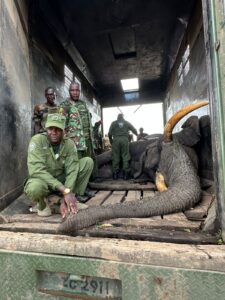Mara Elephant Project closely partners with the Kenya Wildlife Service (KWS) and Sheldrick Wildlife Trust (SWT) to provide veterinary intervention to injured elephants in the Greater Mara Ecosystem. Led by veteran KWS veterinarian Dr. Michael Njoroge, the SWT sponsored Mara Mobile Vet Unit promptly responds to the injured wildlife in the Mara increasing their chances of survival in the face of growing threats.
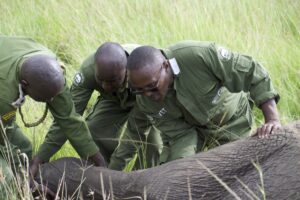 Growing up on the slopes of Mount Kenya, Dr. Njoroge developed a keen passion for wildlife from a very young age. Mount Kenya is rich in biodiversity and comprises both a national reserve and a forest reserve and home to a large population of threatened animal species including elephants. He often encountered wildlife vets working around his home and these firsthand encounters led him to study veterinary medicine at the University of Nairobi. “The proudest moment in my life was when I graduated from vet school back in 2002, it’s quite a challenging course and sometimes you wonder if you will ever graduate,” he says. “So, finally when you graduate, you feel very good.”
Growing up on the slopes of Mount Kenya, Dr. Njoroge developed a keen passion for wildlife from a very young age. Mount Kenya is rich in biodiversity and comprises both a national reserve and a forest reserve and home to a large population of threatened animal species including elephants. He often encountered wildlife vets working around his home and these firsthand encounters led him to study veterinary medicine at the University of Nairobi. “The proudest moment in my life was when I graduated from vet school back in 2002, it’s quite a challenging course and sometimes you wonder if you will ever graduate,” he says. “So, finally when you graduate, you feel very good.”
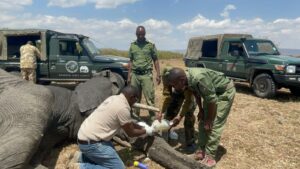 Practicing for over two decades, Dr. Njoroge has seen it all working for KWS in almost every wildlife area in Kenya. He’s been stationed in the Mara for a little over a year and in 2023, MEP assisted his team with 34 total elephant treatments. “I remember the first elephant treatment we did together in Siana Conservancy,” he says. “It was an elephant that had been speared and it was on top of a hill and the closest helicopter was in Nairobi. With assistance from the MEP and KWS rangers on the ground, we were able to spot the elephant and dart it before it ran back down the hill.” Unpredictable situations like that are a daily encounter for Dr. Njoroge and his team.
Practicing for over two decades, Dr. Njoroge has seen it all working for KWS in almost every wildlife area in Kenya. He’s been stationed in the Mara for a little over a year and in 2023, MEP assisted his team with 34 total elephant treatments. “I remember the first elephant treatment we did together in Siana Conservancy,” he says. “It was an elephant that had been speared and it was on top of a hill and the closest helicopter was in Nairobi. With assistance from the MEP and KWS rangers on the ground, we were able to spot the elephant and dart it before it ran back down the hill.” Unpredictable situations like that are a daily encounter for Dr. Njoroge and his team.
In fact, terrain is often one of the more challenging obstacles Dr. Njoroge faces on the job. He and his team are often on foot or in their vehicle navigating rough terrain all while darting an animal with anesthesia and tracking that animal as it falls asleep for treatment. “There are a number of challenges you may encounter, sometimes the animal may attack you when you’re tracking it on foot in order to dart it, other times the animal might disappear in the bush,” he says. Dr. Njoroge adds that his years of experience in the field helps him make big decisions quickly when wildlife is in need.
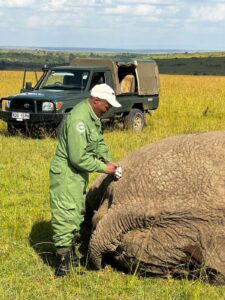 As he nears his 23rd year in a high stress profession, you’d think Dr. Njoroge is ready to slow down, but he says that treating wildlife and seeing them fully recover is why he continues to love what he does. He also is hopeful for the next generation of conservationists and invests much of his time training young Kenyans to be wildlife veterinarians. He often has two interns with him and enjoys imparting his extensive field experience on to young minds. “Coexistence between humans and wildlife is crucial,” he says. “Educating the communities living around wildlife and giving them opportunities so that they can understand why it is important to conserve wildlife is the key.”
As he nears his 23rd year in a high stress profession, you’d think Dr. Njoroge is ready to slow down, but he says that treating wildlife and seeing them fully recover is why he continues to love what he does. He also is hopeful for the next generation of conservationists and invests much of his time training young Kenyans to be wildlife veterinarians. He often has two interns with him and enjoys imparting his extensive field experience on to young minds. “Coexistence between humans and wildlife is crucial,” he says. “Educating the communities living around wildlife and giving them opportunities so that they can understand why it is important to conserve wildlife is the key.”
There is no Mara Elephant Project without our partners, which is why we were honored to highlight the great work of KWS Vet Dr. Njoroge on MEP’s first sponsored edition of Boots on the Ground podcast.




